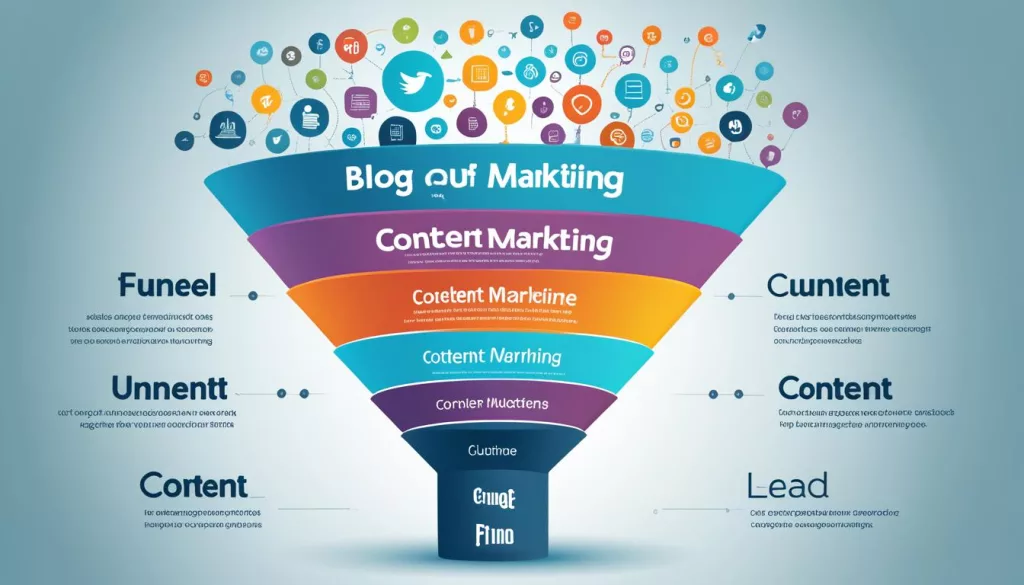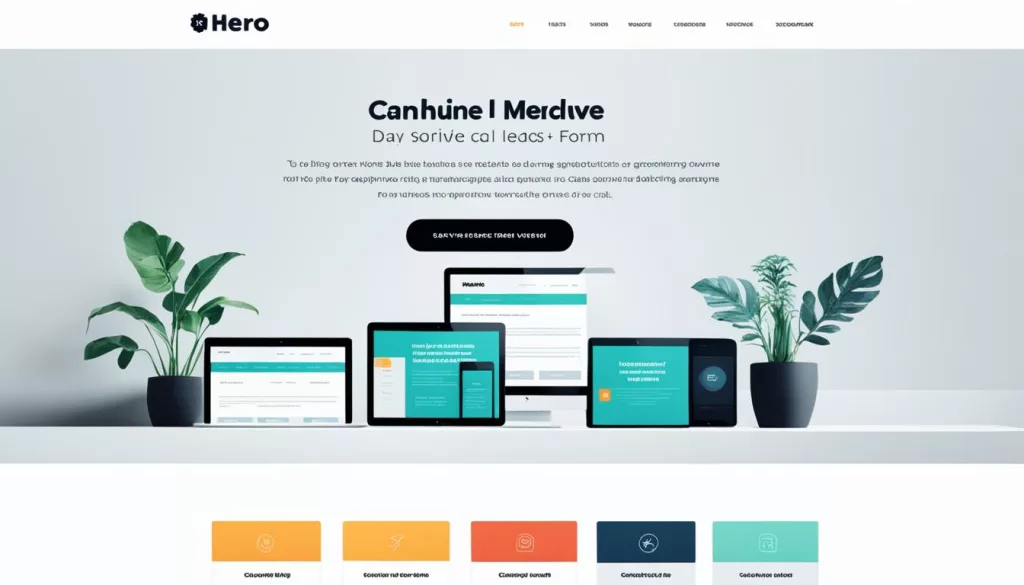Lead generation is a crucial aspect of digital marketing agencies’ operations. However, it can be challenging to consistently acquire high-quality leads. In fact, 54% of marketers say improving lead quality is their greatest challenge. The good news is that there are effective strategies and techniques that agencies can implement to overcome these obstacles and increase their online leads.
In this article, we will dive into the world of lead generation strategies and techniques specifically tailored for the digital marketing industry. Whether you are an established agency looking to refine your lead generation efforts or a new agency aiming to build a strong foundation, this guide will provide you with in-depth insights and valuable tips to generate digital marketing leads effectively.
Key Takeaways:
- Lead generation is a key challenge faced by digital marketing agencies.
- Implementing effective lead generation strategies can increase online leads.
- Understanding the unique challenges of lead generation for digital marketing agencies is crucial.
- Leveraging content marketing and creating lead magnets can attract and engage potential clients.
- Utilizing SEO and website optimization is essential for driving organic traffic and generating leads.
Understanding the Challenges of Lead Generation for Digital Marketing Agencies
Digital marketing agencies face unique challenges when it comes to lead generation. Acquiring clients requires a different approach than helping clients acquire customers, leading to obstacles in attracting and qualifying leads. Understanding these challenges is crucial for developing effective lead generation strategies.
One of the main challenges is attracting clients who are actively seeking digital marketing services. While traditional marketing strategies focus on targeted advertising, digital marketing agencies need to reach potential clients who are actively searching for their services online. This requires a solid understanding of search engine optimization (SEO) techniques and the ability to position the agency’s website and content in front of the right audience.
Another challenge lies in qualifying leads effectively. Digital marketing agencies often receive inquiries from potential clients who may not be the right fit for their services. It’s important to identify qualified leads who have a genuine need for the agency’s expertise and are ready to engage in meaningful discussions. This can be achieved through careful lead nurturing processes and the implementation of qualification criteria based on the agency’s target customer persona.
Common Challenges in Lead Generation for Digital Marketing Agencies
| Challenge | Description |
|---|---|
| Attracting the right clients | Reaching potential clients actively seeking digital marketing services |
| Qualifying leads effectively | Identifying and nurturing leads who are genuinely interested in the agency’s services |
| Standing out from competitors | Differentiating the agency’s offerings and value proposition in a competitive market |
| Adapting to changing digital marketing trends | Staying up to date with the latest marketing strategies and technologies |
To overcome these challenges, digital marketing agencies can focus on creating compelling and targeted content, developing strategic partnerships, and leveraging the power of social media platforms to attract and engage potential clients. By understanding the unique challenges they face, agencies can develop tailored lead generation strategies that attract qualified leads and drive business growth.
Leveraging Content Marketing for Lead Generation
Content marketing is an invaluable strategy for lead generation in the digital marketing industry. By creating valuable and engaging content, digital marketing agencies can attract and nurture leads, ultimately driving conversions and revenue. The key is to develop a comprehensive content strategy that encompasses various elements of the customer journey, from awareness to decision-making.
One effective way to leverage content marketing for lead generation is by showcasing pricing plans. Clearly and transparently displaying your pricing options can help potential clients determine if your services align with their budget. This upfront information establishes trust and filters out unqualified leads, ensuring you attract prospects who are genuinely interested in your offerings.
Another powerful tactic is to highlight client reviews and testimonials. Incorporate client feedback into your content strategy, showcasing success stories and demonstrating the value you provide. Prospective clients often rely on the opinions and experiences of others to make informed decisions. By including positive reviews, you can build credibility and encourage leads to take the next step.
Additionally, emphasizing unique selling points is crucial in differentiating your agency from competitors. Identify what sets you apart in terms of expertise, service offerings, or industry experience, and incorporate these unique selling points into your content. This can be accomplished through thought leadership articles, case studies, or interactive content that showcases your agency’s strengths and expertise.
To visually illustrate the power of leveraging content marketing for lead generation, here is a table summarizing the benefits and strategies:
| Benefits of Content Marketing for Lead Generation | Strategies to Implement |
|---|---|
|
– Attract high-quality leads – Nurture leads through valuable content – Build trust and credibility – Showcase expertise and industry knowledge |
– Create informative blog posts and articles – Develop downloadable resources such as ebooks or whitepapers – Offer webinars or online events – Produce engaging videos or podcasts |
The Power of Content Marketing Strategies
“Content marketing is the art of communicating with your customers and prospects without selling. It is non-interruption marketing. Instead of pitching your products or services, you are delivering information that makes your buyer more intelligent. The essence of this content strategy is the belief that if we, as businesses, deliver consistent, ongoing valuable information to buyers, they ultimately reward us with their business and loyalty.” – Joe Pulizzi
Content marketing allows digital marketing agencies to engage with prospects, educate them about your services, and ultimately convert them into loyal customers. By crafting compelling content, showcasing pricing plans, highlighting client reviews, and emphasizing unique selling points, your agency can effectively generate leads and build lasting relationships with potential clients.

The Pros and Cons of Buying Digital Marketing Leads
When it comes to lead generation in the digital marketing industry, some agencies opt for the convenience of buying leads instead of generating them organically. While this may seem like a quick and simple solution, it’s important to consider the pros and cons before making a decision.
The Pros of Buying Leads:
- Time-Saving: Buying leads can save your agency valuable time and resources as you don’t have to invest in extensive lead generation efforts.
- Immediate Access: Purchasing leads gives you instant access to a pool of potential clients who have already expressed interest in your services.
- Expanded Reach: Buying leads allows you to expand your reach beyond your existing network, potentially exposing your agency to new opportunities.
The Cons of Buying Leads:
- Higher Cost: Buying leads can be more expensive in the long run compared to organic lead generation methods. The cost per lead may vary depending on the quality and exclusivity of the leads.
- Lead Quality and Accuracy: There is a risk of receiving leads that are of lower quality or not relevant to your agency’s specific services. It’s important to thoroughly vet the lead provider and ensure that the leads meet your criteria.
- GDPR Compliance: Digital marketing agencies must be mindful of GDPR regulations when buying leads. There is a legal obligation to ensure that the leads are obtained and used in a compliant manner, with proper consent and data protection measures in place.
Before buying leads, it’s crucial to weigh these pros and cons and consider your agency’s specific needs and goals. Conduct thorough research on lead providers, assess lead quality, and ensure that you can comply with GDPR regulations.
Remember, lead generation is not a one-size-fits-all approach, and what works for one agency may not be suitable for another. Analyze your resources, budget, and target audience to make an informed decision that aligns with your overall lead generation strategy.
| Pros of Buying Leads | Cons of Buying Leads |
|---|---|
| Time-Saving | Higher Cost |
| Immediate Access | Lead Quality and Accuracy |
| Expanded Reach | GDPR Compliance |
Defining Your Ideal Customer Persona
Before implementing lead generation strategies, it is important to define your ideal customer persona. This involves creating a profile of your target audience based on specific parameters such as geography, industry, company size, and interests. By clearly defining your ideal customer, you can tailor your lead generation efforts to attract the right audience and improve conversion rates.
When defining your ideal customer persona, consider the following factors:
- Demographic information: Understand the age, gender, income level, and other relevant demographic details of your target audience.
- Industry and company size: Identify the industries and company sizes that align with your digital marketing services.
- Geography: Determine the geographical locations where your ideal customers are located.
- Interests and behavior: Explore the interests, online behavior, and preferences of your target audience to deliver tailored messaging.
By gathering and analyzing data related to the above factors, you can create a comprehensive customer profile that represents your ideal customer persona. This profile will serve as a guide for your lead generation efforts, helping you to effectively target the right audience and increase your chances of acquiring high-quality leads.
Defining your ideal customer persona is like laying a strong foundation for your lead generation strategies. It ensures that you invest your resources and efforts in attracting the audience most likely to convert into valuable customers.
As an example, let’s consider a digital marketing agency specializing in e-commerce solutions. Their ideal customer persona could be:
| Demographic | Industry | Company Size | Geography | Interests |
|---|---|---|---|---|
| Age 25-40 Both genders Mid to high income |
E-commerce Online retail |
Small to medium-sized businesses | United States | Online shopping Social media marketing Website optimization |
This customer profile helps the agency tailor their lead generation efforts specifically towards e-commerce businesses in the United States, effectively showcasing their expertise in online retail and attracting leads who are interested in their specialized services.
By defining your ideal customer persona, you can align your lead generation strategies with the needs and preferences of your target audience. This targeted approach increases the likelihood of attracting valuable leads and converting them into satisfied customers.
Creating Effective Lead Magnets
Lead magnets play a crucial role in enticing potential clients to share their contact information. These valuable resources provide high-value content that showcases the expertise of digital marketing agencies. By offering lead magnets such as webinars, checklists, ebooks, and templates, agencies can attract and engage their target audience, ultimately generating more leads.
“Lead magnets provide value and showcase the agency’s expertise, helping to generate more leads.”
Webinars: Delivering Knowledge and Insights
Webinars are an effective lead magnet that allows digital marketing agencies to share valuable knowledge and insights with their audience. By hosting webinars on topics that resonate with potential clients, agencies can position themselves as industry experts and build trust. This engagement enables agencies to capture leads and nurture them through the sales funnel.
Checklists: Streamlining Processes and Tasks
Checklists are practical tools that simplify complex processes and tasks for potential clients. By offering checklists that address common pain points or challenges, digital marketing agencies can provide immediate value. This not only helps in capturing leads but also demonstrates the agency’s ability to deliver results efficiently.
Ebooks: Sharing In-Depth Expertise
Ebooks are comprehensive resources that allow digital marketing agencies to share in-depth expertise on specific topics. By creating ebooks that cover industry trends, best practices, or case studies, agencies can position themselves as thought leaders. These high-value resources attract leads who are eager to learn more about the agency’s capabilities and solutions.
Templates: Offering Practical Solutions
Templates are practical resources that provide potential clients with ready-to-use solutions. By offering templates that address common challenges or simplify processes, digital marketing agencies can engage their audience and demonstrate their value. These resources serve as a tangible demonstration of the agency’s expertise and can significantly influence lead generation efforts.
“Lead magnets attract and engage potential clients, showcasing the value and expertise of the agency.”
By creating effective lead magnets, digital marketing agencies can generate more leads and cultivate meaningful relationships with their target audience. From webinars to templates, these valuable resources provide high-value content that captures leads’ attention and incentivizes them to take the next step in their journey with the agency.
Using SEO and Website Optimization for Lead Generation
One of the key strategies for generating leads in the digital marketing industry is leveraging search engine optimization (SEO) and website optimization. Through these techniques, digital marketing agencies can drive organic traffic, improve their visibility in search engine results, and attract targeted traffic to their websites.
Effective SEO involves optimizing your website and content for relevant keywords that potential clients use when searching for products or services. By conducting thorough keyword research and strategically incorporating these keywords into your website’s meta tags, headings, and content, you can increase your chances of appearing prominently in search engine rankings.
Website optimization goes hand in hand with SEO, as it focuses on enhancing user experience, website speed, and mobile responsiveness. By ensuring that your website is user-friendly, loads quickly, and adapts well to different devices, you provide a seamless browsing experience for potential leads, encouraging them to stay on your site and engage with your content.
“Well-optimized websites have higher chances of attracting organic traffic and converting visitors into leads.”
In addition to optimizing your overall website, creating dedicated lead generation landing pages is a highly effective strategy. These landing pages are specifically designed to capture valuable lead information, such as name and email address, in exchange for valuable content or offers. By utilizing compelling headlines, persuasive copy, and clear call-to-action buttons, you can increase the conversion rate of these landing pages, effectively transforming website visitors into leads.

| Benefits of SEO and Website Optimization for Lead Generation | Challenges of SEO and Website Optimization for Lead Generation |
|---|---|
|
|
By utilizing SEO and website optimization techniques, digital marketing agencies can generate a steady flow of organic traffic and attract high-quality leads. However, it is essential to stay updated with the latest SEO trends and algorithm changes to maintain your competitive edge and effectively capture the attention of your target audience.
Conclusion
Lead generation is a fundamental aspect of achieving success for digital marketing agencies. By implementing effective strategies and utilizing various techniques, agencies can attract and acquire high-quality leads. Throughout this article, we have provided valuable insights and tips for lead generation in the digital marketing industry.
By understanding the unique challenges faced by digital marketing agencies, such as attracting and qualifying clients, agencies can develop targeted lead generation strategies to overcome these obstacles. Leveraging content marketing, showcasing pricing plans, client reviews, and highlighting unique selling points can help agencies generate more leads and establish trust with potential clients.
Defining your ideal customer persona is crucial before implementing any lead generation strategies. By creating a detailed profile of your target audience, including demographics and interests, you can tailor your efforts to attract the right leads and improve conversion rates. Additionally, creating effective lead magnets, such as webinars, checklists, and templates, can incentivize leads to share their contact information and further engage with your agency.
Furthermore, SEO and website optimization play a vital role in driving organic traffic and generating leads. By optimizing your website and content for relevant keywords and creating lead generation landing pages, you can improve your visibility in search engine results and capture leads effectively. By incorporating these strategies and techniques, digital marketing agencies can enhance their lead generation efforts and achieve sustainable success in the competitive landscape.
FAQ
How can I get leads for digital marketing?
There are several strategies and techniques that you can implement to generate leads for digital marketing. Some effective methods include leveraging content marketing, creating lead magnets, optimizing your website for SEO, and defining your ideal customer persona.
What are the challenges of lead generation for digital marketing agencies?
Digital marketing agencies face obstacles in attracting and qualifying leads. Acquiring clients requires a different approach than helping clients acquire customers, leading to unique challenges in lead generation.
How can I leverage content marketing for lead generation?
Content marketing is a powerful tool for lead generation. Digital marketing agencies can create valuable and engaging content, such as showcasing pricing plans, highlighting client reviews, and emphasizing unique selling points, to attract and nurture leads.
What are the pros and cons of buying digital marketing leads?
Buying leads can be a quick solution, but it also has its pros and cons. While it may save time, buying leads can be more expensive, and the leads may not be unique to your agency. There is also a risk of violating GDPR if the leads are not fully compliant.
Why is it important to define my ideal customer persona?
Defining your ideal customer persona helps you create a profile of your target audience based on specific parameters such as geography, industry, company size, and interests. This allows you to tailor your lead generation efforts to attract the right audience and improve conversion rates.
How can I create effective lead magnets?
Lead magnets are valuable resources that incentivize leads to share their contact information. Digital marketing agencies can create lead magnets such as webinars, checklists, ebooks, and templates to attract and engage potential clients. These lead magnets provide value and showcase the agency’s expertise, helping to generate more leads.
How can SEO and website optimization help with lead generation?
SEO and website optimization are crucial for driving organic traffic and generating leads. By optimizing your website and content for relevant keywords, you can improve your visibility in search engine results and attract targeted traffic. Creating lead generation landing pages and optimizing them for conversions is also essential for capturing leads and nurturing them through the sales funnel.
What are some effective lead generation strategies for digital marketing?
Effective lead generation strategies for digital marketing include leveraging content marketing, creating lead magnets, optimizing SEO and website, and defining your ideal customer persona. By implementing these techniques, digital marketing agencies can attract and acquire high-quality leads.





